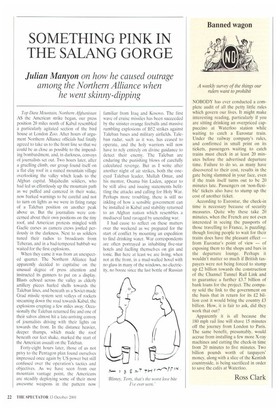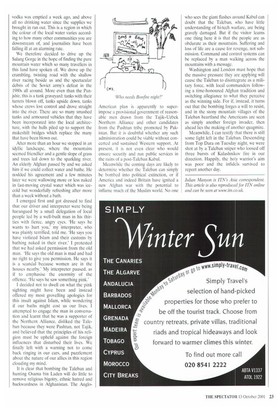SOMETHING PINK IN THE SALANG GORGE
Julian Manyon on how he caused outrage
among the Northern Alliance when he went skinny-dipping
Top Dora Mountain, Northern Afghanistan AS the American strike began, our press position 20 miles north of Kabul resembled a particularly agitated section of the bird house at London Zoo. After hours of argument Northern Alliance officials had finally agreed to take us to the front line so that we could be as close as possible to the impending bombardment, and, in darkness, convoys of journalists set out. Two hours later, after a gruelling climb, our group found itself on a flat clay roof in a ruined mountain village overlooking the valley which leads to the Afghan capital. Mujahedin soldiers, who had led us effortlessly up the mountain path as we puffed and cantered in their wake, now barked warnings to be careful and not to turn on lights as we were in firing range of a Taleban position on another peak above us. But the journalists were concerned about their own positions on the tiny roof, and American protests mingled with Gaelic curses as camera crews jostled perilously in the darkness. Next to us soldiers tuned their radios to broadcasts from Teheran, and in a bad-tempered hubbub we waited for the first explosions.
When they came it was from an unexpected quarter. The Northern Alliance had apparently decided to capitalise on the unusual degree of press attention and instructed its gunners to put on a display. Blasts echoed across the valley as elderly artillery pieces hurled shells towards the Taleban lines, and beneath us a Soviet-made Grad missile system sent volleys of rockets streaming down the road towards Kabul, the explosions erupting a few miles away. Occasionally the Taleban returned fire and one of their salvos almost hit a late-arriving convoy of journalists driving with their lights on towards the front. In the distance heavier, deeper thumps, which made the roof beneath our feet shake, marked the start of the American assault on the Taleban.
Forty-eight hours later, those of us not privy to the Pentagon plan found ourselves impressed once again by US power but still confused over the operation's tactics and objectives. As we have seen from our mountain vantage point, the Americans are steadily deploying some of their most awesome weapons in the pattern now
familiar from Iraq and Kosovo. The first wave of cruise missiles has been succeeded by the sinister orange fireballs and massive rumbling explosions of B52 strikes against Taleban bases and military airfields. Taleban radar, such as it was, has ceased to operate, and the holy warriors will now have to rely entirely on divine guidance to detect their enemy. The Taleban are enduring the punishing blows of carefully calculated revenge. But as I write after another night of air strikes, both the oneeyed Taleban leader, Mullah Omar, and his mentor, Osama bin Laden, appear to be still alive and issuing statements belittling the attacks and calling for Holy War. Perhaps more troubling, there is still no inkling of how a sensible government can be installed in Kabul and stability returned to an Afghan nation which resembles a mediaeval land ravaged by unending war.
I had cause to reflect on these matters over the weekend as we prepared for the start of conflict by mounting an expedition to find drinking water. War correspondents are often portrayed as inhabiting five-star hotels and fuelling themselves on gin and tonic. But here at least we are living, when not at the front, in a mud-walled hovel with no glass in many of the windows, no electricity, no booze since the last bottle of Russian NOBODY has ever conducted a complete audit of all the petty little rules which govern our lives. It might make interesting reading, particularly if you are sitting drinking an overpriced cappuccino at Waterloo station while waiting to catch a Eurostar train. Under the railway company's rules, and confirmed in small print on its tickets, passengers waiting to catch trains must check in at least 20 minutes before the advertised departure time. Failure to do so, as many have discovered to their cost, results in the gate being slammed in your face, even if the train itself turns out to be 20 minutes late. Passengers on 'non-flexible' tickets also have to stump up the cost of another ticket.
According to Eurostar, the check-in time is necessary because of security measures. Quite why these take 20 minutes, when the French are not even interested in seeing the passports of those travelling to France, is puzzling; though forcing people to wait for their trains does have the pleasant effect — from Eurostar's point of view — of exposing them to the shops and bars in the departure lounge. Perhaps it wouldn't matter so much if British taxpayers were not being forced to stump up £2 billion towards the construction of the Channel Tunnel Rail Link and to guarantee a further £3.7 billion of bank loans for the project. The company sold the link to the government on the basis that in return for its £2 billion cost it would bring the country £3 billion. How, it is fair to ask, did they work that out?
Apparently it is all because the 180 mph rail line will shave 15 minutes off the journey from London to Paris. The same benefit, presumably, would accrue from installing a few more X-ray machines and cutting the check-in time from 20 minutes to five minutes. Two billion pounds worth of taxpayers' money, along with a slice of the Kentish countryside, is being sacrificed in order to save the cafes at Waterloo. vodka was emptied a week ago, and above all no drinking water since the supplies we brought in ran out. This is a region in which the colour of the local water varies according to how many other communities you are downstream of, and journalists have been falling ill at an alarming rate.
We therefore decided to drive up the Salang Gorge in the hope of finding the pure mountain water which so many travellers in this land have spoken of. We drove up the crumbling, twisting road with the shallow river racing beside us and the spectacular debris of the Soviet army's defeat in the 1980s all around. More even than the Panjshir, this is a tank graveyard: tanks with their turrets blown off, tanks upside down, tanks whose crews lost control and drove straight into the river. There are so many smashed tanks and armoured vehicles that they have been incorporated into the local architecture, with the hulls piled up to support the makeshift bridges which replace the many that have been blown out.
After more than an hour we stopped in an idyllic landscape, where the mountains seemed friendlier and a gentle slope of grass and trees led down to the sparkling river. An elderly Afghan passed by and we asked him if we could collect water and bathe. He nodded his agreement and a few minutes later we were wallowing more or less naked in fast-moving crystal water which was icecold but wonderfully refreshing after more than a week without a bath.
I emerged first and got dressed to find that our driver and interpreter were being harangued by a small delegation of local people led by a well-built man in his thirties with fierce, angry eyes. 'He says he wants to hurt you,' my interpreter, who was plainly terrified, told me. 'He says you have violated Islam and their customs by bathing naked in their river.' I protested that we had asked permission from the old man, 'He says the old man is mad and had no right to give you permission. He says it is a scandal because women are in the houses nearby.' My interpreter paused, as if to emphasise the enormity of the offence. 'He says he saw something pink.'
I decided not to dwell on what the pink sighting might have been and instead offered my most grovelling apologies for this insult against Islam, while wondering if our baths might cost us our lives. I attempted to engage the man in conversation and learnt that he was a supporter of the Northern Alliance, disliked the Taleban because they were Pashtun, not Tajik, and believed that the principles of his religion must be upheld against the foreign influences that disturbed their lives. We finally left with a warning not to come back ringing in our ears, and puzzlement about the nature of our allies in this region clouding my mind.
It is clear that bombing the Taleban and hunting Osama bin Laden will do little to remove religious bigotry, ethnic hatred and backwardness in Afghanistan. The Anglo American plan is apparently to superimpose a provisional government of reasonable men drawn from the Tajik—Uzbek Northern Alliance and other candidates from the Pashtun tribe promoted by Pakistan. But it is doubtful whether any such administration could be viable without concerted and sustained Western support. At present, it is not even clear who would ensure security and run public services in the ruins of a post-Taleban Kabul.
Meanwhile the coming days are likely to determine whether the Taleban can simply be bombed into political extinction, or if America and indeed Britain have ignited a new Afghan war with the potential to inflame much of the Muslim world. No one who sees the giant flashes around Kabul can doubt that the Taleban, who have little understanding of hi-tech warfare, are being gravely damaged. But if the visitor learns one thing here it is that the people are as obdurate as their mountains. Suffering and loss of life are a cause for revenge, not submission. Command and control systems can be replaced by a man walking across the mountains with a message.
Washington and London must hope that the massive pressure they are applying will cause the Taleban to disintegrate as a military force, with local commanders following a time-honoured Afghan tradition and switching allegiance to what they perceive as the winning side. For if, instead, it turns out that the bombing forges a will to resist, and in the stony mountain villages of the Taleban heartland the Americans are seen as simply another foreign invader, then ahead lies the making of another quagmire.
Meanwhile, I can testify that there is still some fight left in the Taleban. Descending from Top Dara on Tuesday night, we were shot at by a Taleban sniper who loosed off three bursts of Kalashnikov fire in our direction. Happily, the holy warrior's aim was poor and the infidels survived to report another day.
Julian Manyon is ITN's Asia correspondent. This article is also reproduced for ITN online and can be seen at www.itn.co.uk.



























































































 Previous page
Previous page